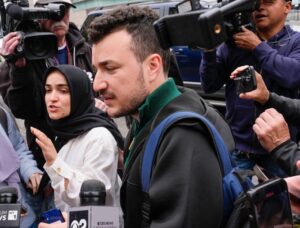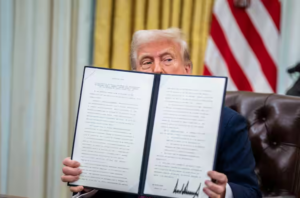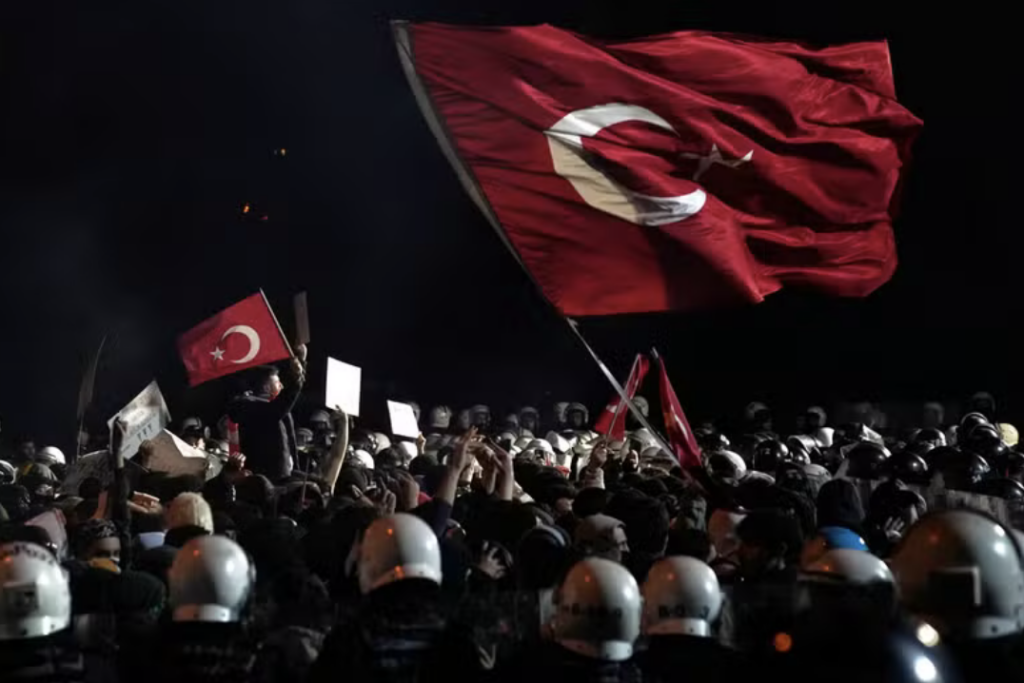Ekrem Imamoglu faces charges of corruption, money laundering and supporting terrorism. In addition to him, 96 other politicians, including local elected members of the Republican People’s Party (CHP) and close associates, have been arrested as part of the same investigation. The charges brought against Ekrem Imamoglu are regarded by his supporters and many international observers as trumped-up. In their view, this judicial offensive is primarily aimed at removing a political rival who represents a serious threat to the hegemony of President Erdoğan.
On 23 March, the first of the charges against Imamoglu was upheld, and he was taken into custody, marking a new stage in an increasingly harsh campaign of repression against the opposition. It is no coincidence that this arrest comes at a time when Ekrem Imamoglu was tipped to become the CHP’s presidential candidate, strengthening his position as Erdoğan’s main opponent.
An explosive political environment
Imamoglu’s arrest does not come in a political vacuum. The climate has already been tense since the March 2024 municipal elections, when Erdoğan’s AKP lost control of major cities, including Istanbul, to the CHP. This electoral setback reinforced İmamoğlu’s rise as a charismatic leader and possible alternative to Erdoğan. What’s more, the day before his arrest, his thirty-year university degree was cancelled by Istanbul University, heightening suspicions of political manoeuvring to prevent him from running for the presidency.
The authorities have also put in place a series of repressive measures to stifle protests, such as restricting social networks and closing down certain public places in Istanbul. However, this has not prevented large-scale demonstrations from breaking out across the country, symbolising growing discontent with the regime.
A Wide range of reactions
The demonstrations that followed İmamoğlu’s arrest were among the most massive Turkey has seen in a decade. More than 55 provinces saw protest rallies, expressing a popular anger that goes beyond mere support for a politician. The demonstrations also highlighted the scale of the authorities’ repression: almost 1,900 people were arrested, and many others were prevented from demonstrating by severe restrictions on social networks.
The Turkish opposition has described this action as ‘tyrannical’, while calls for a boycott of companies close to the government are multiplying. Human rights organisations and several Western governments have expressed their concern, describing Ekrem Imamoglu’s arrest as an ‘authoritarian drift’. However, the Ankara government rejects this criticism, claiming that justice is taking its course without ‘foreign interference’.
An uncertain future
With a crucial presidential election just a few months away, Ekrem Imamoglu’s arrest could redefine the Turkish political scene. For many, the arrest is seen as an attempt to eradicate any possibility of political alternation, particularly by neutralising his main opponent. However, rather than weakening him, this act could, on the contrary, galvanise the opposition and widen the gap between the authorities and a population that is increasingly inclined to protest.
Turkey thus seems to be at a turning point. The fate of Ekrem Imamoglu, already plunged into uncertainty, could have repercussions for the outcome of the forthcoming elections and the country’s political future. Against this backdrop of heightened tensions, the question of democratic freedoms and the rule of law in Turkey is more pressing than ever.










